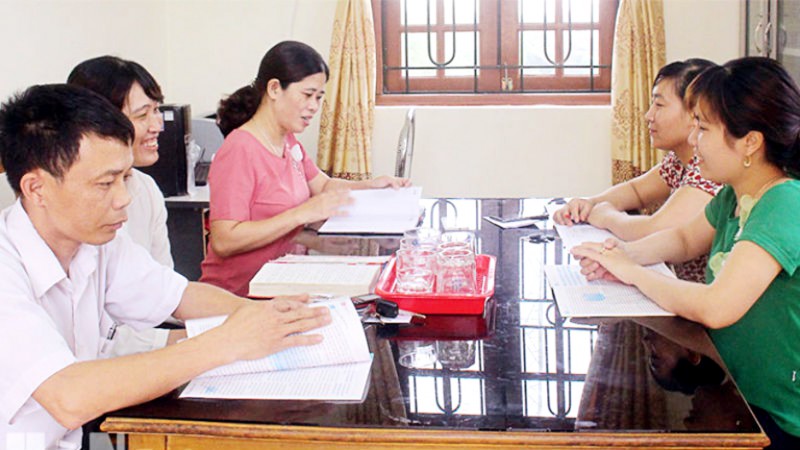What is grassroots conciliation? What are the cases of grassroots conciliation in Vietnam? - Minh Hoa (Binh Dinh, Vietnam)

What is grassroots mediation? 07 cases of grassroots conciliation in Vietnam (Internet image)
1. What is grassroots conciliation?
According to Clause 1, Article 2 of the Law on Grassroots Conciliation 2013, grassroots conciliation is a mediator's guidance and assistance in reaching an agreement and voluntary settlement of conflicts, disputes or violations. according to the Law on Grassroots Conciliation 2013.
2. 07 cases of grassroots conciliation in Vietnam
Specifically, in Clause 1, Article 5 of Decree 15/2014/ND-CP, grassroots conciliation shall be carried out for the following conflicts, disputes and violations of law:
(1) Conflicts between parties (caused by different views about life, lifestyles or characters or conflicts over the use of passage through houses, public access, electricity or water facilities or auxiliary works, living timetable or causing insanitation in public places, or for other reasons);
(2) Disputes arising from civil relations such as disputes over ownership right, civil obligations, civil contracts, inheritance or land use rights;
(3) Disputes arising from marriage and family relations such as disputes arising from husband and wife relation; parent and child relation, grandparent and grandchild relation, sibling relation and relation between other family members; alimony; identification of parents and children; child adoption; divorce;
(4) Violations of law which are not subject to penal liability examination or administrative sanctioning as prescribed by law;
(5) Violations of the criminal law in the following cases:
- Violations not being subject to institution of criminal cases as provided in Article 107 of the Criminal Procedure Code 2003 (currently Article 157 of the Criminal Procedure Code 2015 (amended in 2021)) and not being administratively handled by competent state agencies as prescribed by law;
- Violations for which criminal cases, as prescribed by law, shall be instituted only at the request of victims but victims do not request as prescribed in Clause 1, Article 105 of the Criminal Procedure Code 2003 (currently Article 155 of the Criminal Procedure Code 2015 (amended in 2021)), and which are not administratively handled by competent state agencies as prescribed by law;
- Violations for which criminal cases have been instituted but later investigation termination decisions or criminal case termination decisions are issued by procedure-conducting agencies under Clause 2, Article 164 of Criminal Procedure Code 2003 (currently Clause 1 Article 230 of the Criminal Procedure Code 2015 (amended in 2021)), or under Clause 1, Article 169 of the Criminal Procedure Code 2003 (currently Clause 1 Article 248 of the Criminal Procedure Code 2015 (amended in 2021))
- And which are not administratively handled by competent state agencies as prescribed by law;
(6) Violations of law subject to the measure of education in communes, wards or townships under the Decree 111/2013/ND-CP (currently Decree 120/2021/ND-CP) or violations eligible for application of measures substituting administrative handling under Chapter II, Part 5 of the Law on Handling of Administrative Violations 2012;
(7) Other cases and matters not prohibited by law.
3. Principles of organization and operation of grassroots conciliation in Vietnam
The organization and operation of grassroots conciliation shall be carried out based on the following principles:
- Respecting the voluntariness of the parties; optional, imposed on the parties in grassroots conciliation.
- Ensuring compliance with state policies and laws, social ethics, fine customs, and practices; fostering a spirit of solidarity, mutual assistance, and mutual assistance among family members, clans, and the community; and focusing on the legitimate rights and interests of children, women, people with disabilities, and the elderly.
- Objectivity, fairness, timeliness, rationality, and love; keep information about the parties' private lives confidential, except in the cases specified in Clauses 4 and 5 of the Law on Grassroots Conciliation 2013.
- Respecting the will, legitimate rights, and interests of the parties and the legitimate rights and interests of others does not infringe upon the interests of the state or the public.
- Ensuring gender equality in grassroots organization and mediation activities.
- Not using grassroots conciliation to prevent related parties from protecting their interests in accordance with the law or evading administrative or criminal penalties
(Article 4 on the Law on Grassroots Conciliation 2013)
Thanh Rin
- Key word:
- grassroots conciliation in Vietnam
 Article table of contents
Article table of contents










